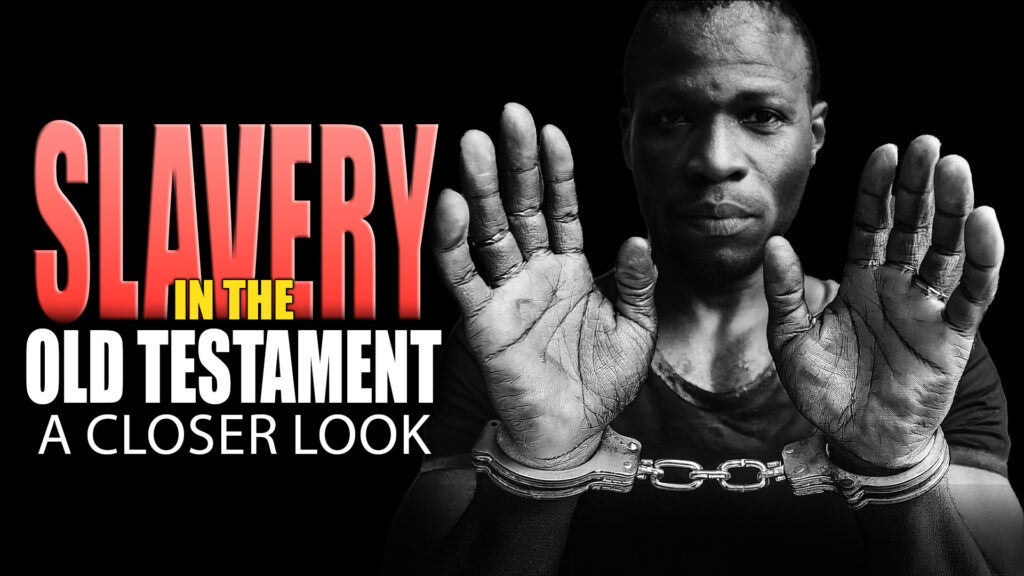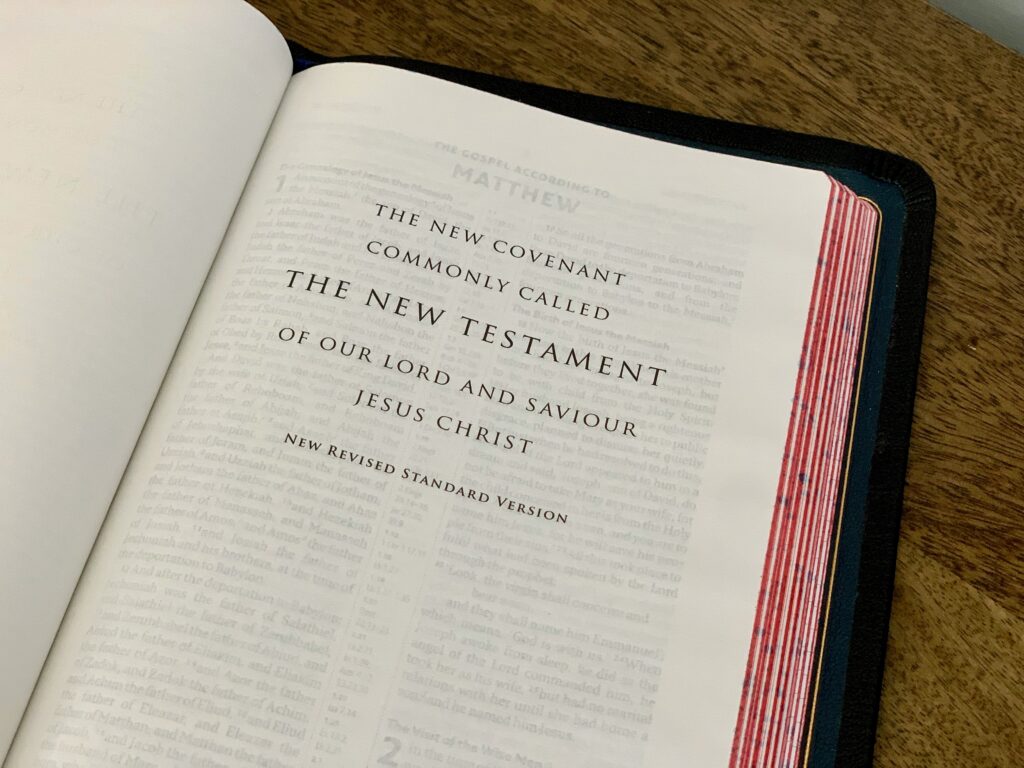
By AC
Here’s an article by Dr. Dallas M. Roark, Ph.D., discussing slavery in the Bible, along with a rebuttal to Sami Zaatari’s article “Rational Muslims Should Object to the Bible.” Our goal in this article is to address some points that haven’t been previously discussed and to expand on expressed points regarding slavery in the Bible. This serves as an introduction to a future, in-depth exploration of specific verses often cited out of context to challenge Christian beliefs. Answers for Christ seeks to equip Christians with thoughtful responses to objections about slavery in the Bible.
Defining INVOLUNTARY vs. VOLUNTARY Slavery
Let’s establish first that there is involuntary slavery and there is voluntary slavery.
Involuntary slavery is a form of slavery where individuals are forced into servitude without consent and are denied the freedom to leave or control their own lives. It involves complete loss of freedom and often includes being treated as property.
Voluntary slavery is when someone willingly enters into servitude, agreeing to surrender personal freedoms and control over their own life. This concept is controversial, as it challenges the limits of consent and human rights.
In this article, we will examine the extent of human rights afforded to slaves, and for clarity, we will use terms like employer, employee, or servant. Terms like master and slave, or owner and servant, often trigger immediate negative reactions due to their strong associations. As noted by scholar Paul Copan.
Likewise, an Israelite strapped for shekels might become an indentured servant to pay off his debt to a “boss” or “employer” (‘adon). Calling him a “master” is often way too strong a term, just as the term ‘ebed (“servant, employee”) typically shouldn’t be translated “slave.” John Goldingay comments that “there is nothing inherently lowly or undignified about being an ‘ebed.” Indeed, it is an honorable, dignified term. * Even when the terms buy, sell, or acquire are used of servants/employees, they don’t mean the person in question is “just property.” – Copan, Paul. Is God a Moral Monster? Making Sense of the Old Testament God. Baker Books, 2011, p. 125.
[More on voluntary servitude (employee) later]
Involuntary Slavery
Frederick Douglass (1817–1895), the former slave and renowned abolitionist, recounted his experiences with his first slave owner, Captain Anthony, in his autobiography.
He was a cruel man, hardened by a long life of slave-holding. He would at times seem to take great pleasure in whipping a slave. I have often been awakened at the dawn of day by the most heart-rending shrieks of an own aunt of mine, whom he used to tie up to a joist, and whip upon her naked back till she was literally covered with blood. No words, no tears, no prayers, from his gory victim, seemed to move his iron heart from its bloody purpose. The louder she screamed, the harder he whipped; and where the blood ran fastest, there he whipped longest. He would whip her to make her scream, and whip her to make her hush; and not until overcome by fatigue, would he cease to swing the blood-clotted cowskin. I remember the first time I ever witnessed this horrible exhibition. I was quite a child, but I well remember it. I never shall forget it whilst I remember any thing. It was the first of a long series of such outrages, of which I was doomed to be a witness and a participant. It struck me with awful force. It was the blood-stained gate, the entrance to the hell of slavery, through which I was about to pass. It was a most terrible spectacle. I wish I could commit to paper the feelings with which I beheld it. Warrant for Trafficking in Humans as Farm Equipment?
The slavery described in Frederick Douglass’s writings, along with that experienced by millions during the Antebellum period, is known as chattel slavery, or involuntary slavery. This type is quite different from the servitude found among the people of Israel, which this article will examine through various passages. It’s a misconception to assume that “slavery” means the same thing across all cultures. In the Bible, indentured servitude was complex and very different from race-based chattel slavery. In ancient Hebrew society, servitude often helped people repay debts, support their families, or resulted from war. The Old Testament includes guidelines for treating servants fairly and humanely. It’s important to remember that words can carry different meanings depending on their context.
Verses Condemning Involuntary Slavery in Israel
Israel was prohibited from expanding its territory beyond what Yahweh had promised to Abraham (Deuteronomy 2:1-23). Additionally, Israel was expressly forbidden from engaging in forced slavery, as outlined in laws starting in Exodus 20.
- “He who kidnaps a man and sells him, or if he is found in his hand, shall surely be put to death.” – Exodus 21:16 (NKJV, * Interlinear)
- In another passage, Moses declares, “If a man is found kidnapping any of his brethren of the children of Israel, and mistreats him or sells him, then that kidnapper shall die; and you shall put away the evil from among you.” – Deuteronomy 24:7 (NKJV, * Interlinear)
- “You shall neither mistreat a stranger nor oppress him, for you were strangers in the land of Egypt.” – Exodus 22:21 (NKJV)
Here is the Greek Septuagint (LXX) text, which is older than the Moseratic text shows this verse is addressing Israelites not being allowed to sell their brethren.
- “15 Whoever smites his father or his mother, let him be certainly put to death. 16 (21:17) Whosoever shall steal one of the children of Israel, and prevail over him and sell him, and he be found with him, let him certainly die. 17 (21:16) He that reviles his father or his mother shall surely die.” – Exodus 21:16 (Brenton’s Septuagint Translation)
Biblical Commandments for Treating Foreigners with Compassion and Justice
While some may argue that these commandments applied solely to Israelites, the Bible emphasizes compassionate treatment for foreigners and prohibits mistreatment (Leviticus 19:33-34). Which brings us right back to the previous verses mentioned earlier (Ex. 21:16; Deu. 24:7). Some verses demonstrate that Israelites were prohibited from mistreating foreigners (like in Exodus and in other places throughout the Bible). Some translations might say “stranger, foreigner, sojourner, etc.” A sojourner is someone who travels, it can be applied to an israelite or a foreigner. It depends on the context. When this word (גֵּר-ger) is used in the Torah passages it is more than often used to refer to a non-israelite.
- “And you shall not mistreat a sojourner or oppress him, for you were sojourners in the land of Egypt.” – Exodus 22:21 (LSB)
- “You shall not oppress a sojourner, since you yourselves know the soul of a sojourner, for you also were sojourners in the land of Egypt.” – Exodus 23:9 (LSB)
- “And you shall not glean your vineyard, nor shall you gather the fallen fruit of your vineyard; you shall leave them for the afflicted and for the sojourner. I am Yahweh your God.” – Leviticus 19:10 (LSB)
- “When a sojourner sojourns with you in your land, you shall not mistreat him. The sojourner who sojourns with you shall be to you as the native among you, and you shall love him as yourself, for you were sojourners in the land of Egypt. I am Yahweh your God. You shall do no wrong in judgment, in measurement of weight, or capacity. You shall have just balances, just weights, a just ephah, and a just hin; I am Yahweh your God, who brought you out from the land of Egypt. And you shall keep all My statutes and all My judgments, and do them; I am Yahweh.” – Leviticus 19:33-37 (LSB)
- “When you reap the harvest of your land, moreover, you shall not reap to the very corners of your field nor gather the gleaning of your harvest; you are to leave them for the afflicted and the sojourner. I am Yahweh your God.” – Leviticus 23:22 (LSB)
- “If a man injures his neighbor, just as he has done, so it shall be done to him: fracture for fracture, eye for eye, tooth for tooth; just as he has injured a man, so it shall be inflicted on him. Thus the one who kills an animal shall make it good, but the one who kills a man shall be put to death. There shall be one standard for you; it shall be for the sojourner as well as the native, for I am Yahweh your God.” Leviticus 24:19-22 (LSB)
- “Now in case a countryman of yours becomes poor and his means with regard to you falter, then you are to sustain him, like a stranger or a sojourner, that he may live with you. Do not take usurious interest from him, but fear your God, that your countryman may live with you.” – Leviticus 25:35-36 (LSB)
- “If a sojourner sojourns among you and observes the Passover to Yahweh, according to the statute of the Passover and according to its custom, so he shall do; you shall have one statute, both for the sojourner and for the native of the land.” – Numbers 9:14 (LSB)
- “There is to be one law and one judgment for you and for the sojourner who sojourns with you.” – Numbers 15:16 (LSB)
- “Then I commanded your judges at that time, saying, ‘Hear the cases between your fellow countrymen, and judge righteously between a man and his fellow countryman, or the sojourner who is with him. You shall not show partiality in judgment; you shall hear the small and the great alike. You shall not be afraid of any man’s presence, for the judgment is God’s. And the case that is too difficult for you, you shall bring to me, and I will hear it.’” – Deuteronomy 1:16-17 (LSB)
- “He executes justice for the orphan and the widow, and shows love for the sojourner by giving him food and clothing. So show love for the sojourner, for you were sojourners in the land of Egypt. You shall fear Yahweh your God; you shall serve Him and cling to Him, and you shall swear by His name. He is your praise and He is your God, who has done these great and fearsome things for you which your eyes have seen.” –Deuteronomy 10:18-21 (LSB)
- “At the end of every three years, you shall bring out all the tithe of your produce in that year, and shall deposit it within your gates. And the Levite, because he has no portion or inheritance among you, and the sojourner, the orphan, and the widow who are in your town, shall come and eat and be satisfied, in order that Yahweh your God may bless you in all the work of your hand which you do.” – Deuteronomy 14:28-29 (LSB)
- “You shall not detest an Edomite, for he is your brother; you shall not detest an Egyptian, because you were an alien in his land. The sons of the third generation who are born to them may enter the assembly of Yahweh.” – Deuteronomy 23:7-8 (LSB)
- “You shall not hand over to his master a slave who has escaped from his master to you. He shall live with you in your midst, in the place which he shall choose in one of your towns where it pleases him; you shall not mistreat him.” – Deuteronomy 23:15-16 (LSB)
- 14 “You shall not oppress a hired person who is afflicted and needy, whether he is one of your brothers or one of your sojourners who is in your land within your gates. 15 You shall give him his wages on his day before the sun goes down, for he is afflicted and sets his soul on it, so that he will not cry against you to Yahweh and it become sin in you.” – Deuteronomy 24:14-15 (LSB)
- “Cursed is he who distorts the justice due an alien, orphan, and widow. And all the people shall say, ‘Amen.’” – Deuteronomy 27:19 (LSB)
- “The sojourner has not lodged outside, for I have opened my doors to the traveler.” – Job 31:32 (LSB)
- “Then the word of Yahweh came to Zechariah saying, ‘Thus has Yahweh of hosts said, “Dispense true justice and practice kindness and compassion each to his brother; and do not oppress the widow or the orphan, the sojourner or the poor; and do not devise evil in your hearts against one another.”‘” – Zechariah 7:8-10 (LSB)
Note: Egypt can mean bondage at times in the bible (Exodus 20:2, Interlinear Bible Hub)
These verses indicate that Israelites were prohibited from oppressing, afflicting, or harming strangers/foreigners, as seen in the metaphorical comparison to their own experience of slavery in Egypt. This implies that they should not inflict similar treatment on people of other nationalities. These verses are general statements about the mistreatment of foreigners in any circumstance.
Voluntary Servitude
Voluntary servitude presents a unique circumstance wherein an individual, facing extreme impoverishment, opts to sell themselves into a relationship with someone capable of providing for them. In Hebrew, this is referred to as “ebed,” signifying a servant or bondman. The Bible depicts Israel as the Lord’s bondservant or employee (servant), employing the same term “ebed” to illustrate this relationship.
A biblical Example of this relationship would be Jacob working for Laban for seven years so that he could marry his daughter Rachel.
“Contrary to the critics this servanthood wasn’t much different experientially from paid employment in a cash economy like ours.” – Copan, Paul. Is God a Moral Monster? Making Sense of the Old Testament God. Baker Books, 2011, p. 125.
People in ancient Israel might choose to sell themselves into servitude due to factors like failed crops, adverse conditions, or overwhelming debt. A father or husband could enter himself, his wife, or his children into service to provide for the family and survive challenging economic times. (Lev. 25:47)
In Israel, servitude was a choice rather than imposed by external forces (Lev. 25:25-54)
Becoming a servant in Israel typically meant a decrease in social status, depending on one’s previous standing. However, this did not mean that mistreatment was acceptable. Although some people were mistreated, God made it clear that such actions were not permissible, and there were consequences for those who treated servants unjustly. (Ex. 21:26-27; Deut. 23:15-16; Deut. 24:14-15)
“When we compare Israel’s servant system with the ancient Near East in general, what we have is a fairly tame and, in many ways, very attractive arrangement for impoverished Israelites. The servant laws aimed to benefit and protect the poor-that is, those most likely to enter indentured service.
Servanthood was voluntary: a person who (for whatever reason) doesn’t have any land “sells himself” (Lev. 25:39, 47; compare Deut. 15:12). Someone might also sell a family member as an indentured servant in another’s household to work until a debt is paid off. Once a person was freed from his servant obliga-tions, he had the “status of full and unencumbered citizenship.”
Old Testament legislation sought to prevent voluntary debt-servitude. A good deal of Mosaic legislation was given to protect the poor from even temporary indentured service. The poor were given opportunities to glean the edges of fields or pick lingering fruit on trees after their fellow Israelites harvested the land (Lev. 19:9-10; 23:22; Deut. 24:20-21). Also, fellow Israelites were commanded to lend freely to the poor (Deut. 15:7-8), who weren’t to be charged interest (Exod. 22:25; Lev. 25:36-37). And if the poor couldn’t afford high-end sacrificial animals, they could sacrifice smaller, less-expensive ones (Lev. 5:7, 11). Also, debts were to be automatically canceled every seven years.
In fact, when debt-servants were released, they were to be generously provided for without a “grudging heart” (Deut. 15:10 NIV). The bottom line: God didn’t want there to be any poverty in Israel (Deut. 15:4). Therefore, servant laws existed to help the poor, not harm them or keep them down.” – Copan, Paul. Is God a Moral Monster? Making Sense of the Old Testament God. Baker Books, 2011, p. 127.
Passages like Deuteronomy 15 provide a blueprint for God’s ultimate plan to eliminate debt-servitude in the land (v. 4). While recognizing that servitude would persist due to issues like poverty (v. 11), God’s plan was designed to guide Israel toward the eventual eradication of indentured servitude.
Legal Human Rights
In the ancient Near East, legislation required the fair treatment of servants as equal people and not chattel property.
- 26 Then God said, “Let Us make man in Our image, according to Our likeness; let them have dominion over the fish of the sea, over the birds of the air, and over the cattle, over all the earth and over every creeping thing that creeps on the earth.” 27 So God created man in His own image; in the image of God He created him; male and female He created them.” – Genesis 1:26-27 (NKJV)
- 13 “If I have despised the cause of my male or female servant when they complained against me, 14 What then shall I do when God rises up? When He punishes, how shall I answer Him? 15 Did not He who made me in the womb make them? Did not the same One fashion us in the womb?” – Job 31:13-15 (NKJV)
“Anchor Bible Dictionary’s essay on “Slavery” observes, “We have in the Bible the first appeals in world literature to treat slaves as human beings for their own sake and not just in the interests of their masters.” By comparison, “the idea of a slave as exclusively the object of rights and as a person outside regular society was apparently alien to the laws of the [rest of the] ANE (p.129)… We can plainly affirm that if the three clear laws of the Old Testament had been followed in the South-that is, the anti-kidnapping, anti-harm, and anti-slave-return regulations in Exodus 21:16, 20, 26-27 and Deuteronomy 23:15-16 and 24:7—then slavery wouldn’t have arisen in America.
If you had to choose between servanthood in Israel and slavery in other ancient Near Eastern cultures, the sane person would pick Israel every time.The indentured servanthood model wasn’t ideal, but Israel’s laws reflected a greater moral sensitivity than their ancient Near Eastern counterparts.
In his classic Theology of the Old Testament, Walther Eichrodt summarizes the contrast well: The norms given in the Book of the Covenant (Exod. 20–23) reveal, when compared with related law-books of the ancient Near East, radical alterations in legal practice. In the evaluation of offences against property, in the treatment of slaves, in the fixing of punishment for indirect offences, and in the rejection of punishment by mutilation, the value of human life is recognized as incomparably greater than all material values. The dominant feature throughout is respect for the rights of everything that has a human face; and this means that views which predominate universally elsewhere have been abandoned, and new principles introduced into legal practice. Ultimately this is possible only because of the profundity of insight hitherto undreamt of into the nobility of Man, which is now recognized as a binding consideration for moral conduct. Hence in Israel even the rights of the lowliest foreigner are placed under the protection of God; and if he is also dependent, without full legal rights, to oppress him is like oppressing the widow and orphan, a transgression worthy of punishment, which calls forth God’s avenging retribution.” – Copan, Paul. Is God a Moral Monster? Making Sense of the Old Testament God. Baker Books, 2011, p. 129, 132-133. (Note: The word offences is not American english. For American english speakers it is offenses).
Paul quotes: Goldingay, John. Old Testament Theology III: Israel’s Life. Downers Grove, IL: Inter Varsity, 2009. See esp. Pp. 458-475.
Conclusion
In examining the complex system of servitude in ancient Israel, it becomes clear that the Old Testament laws offered a distinctive approach that prioritized human dignity and ethical treatment. Unlike the race-based chattel slavery found in later historical contexts, Israel’s servitude laws functioned more as a means for individuals to recover from economic hardship, with built-in protections and provisions to prevent abuse. Through principles that respected the inherent worth of every person, whether native or foreign, these laws provided a framework for justice and compassion, underscoring God’s desire for a society rooted in equity and care for the vulnerable. Ultimately, Israel’s regulations on servitude, guided by divine compassion, set a standard that contrasted sharply with other ancient Near Eastern cultures and pointed toward a moral vision of humanity.
“More information will be released regarding Slavery in the Old Testament: A Closer Look. In a future article, we will be discussing and breaking down specific cherry picked passages by polemicists against the bible. This information is here to help you understand the bible and defend your faith as a follower of Jesus Christ.” – AC






Hey, I think your blog might be having browser compatibility issues. When I look at your blog in Firefox, it looks fine but when opening in Internet Explorer, it has some overlapping. I just wanted to give you a quick heads up! Other then that, great blog!